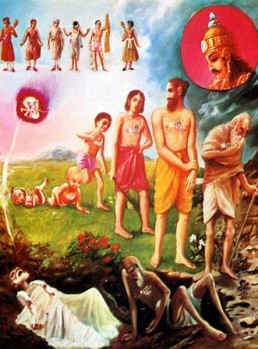Swami Chinmayananda
Swami Chinmayananda Commentary
In stinging reproachful words, Krishna is deliberately lashing at the anxiety-state-neurotic in Arjuna. Krishna, who was so far silent, is now bursting forth into an eloquence, in which every word is a chosen missile, a pounding hammer-stroke that can flatten any victim.
The word ‘Klaibyam’ means, the mental attitude of one who is neither masculine enough to feel a passionate courage and daring, nor womanly enough to feel the soft emotions of hesitation and despair. In modern parlance, sometimes friends wonder at the impotency of another friend and express their surprise with such an exclamation as, “Is he a man or a woman?” — meaning that from his behaviour it is not very easy to decide which characteristic is predominant in him. Emotionally, therefore, Arjuna is behaving now as a contradiction; effeminately-manly and masculinely-effeminate, just as a eunuch of the Indian royal courts — looks like a man but dresses as a woman, talks like a man but feels like a woman, physically strong but mentally weak!
So far Krishna was silent and the silence had a deep meaning. Arjuna, overwhelmed with compassion, had taken the decision not to fight and was all along mustering arguments in support of it. As a diplomat, Krishna knew that it would have been useless to contradict his friend earlier when he was inspired to argue eloquently in support of his own wrong estimate of things. But the tears in the eyes of Arjuna indicated that his inward confusion had reached a climax.
In the tradition of religious devotion, it is very truly said and firmly believed all over the world, that the Lord, in His high seat, keeps mum and is almost deaf so long as we are arguing and asserting our maturity as intellectual beings. But when we come down to live and act as emotional beings, when tears of desperation trickle down the cheeks of true devotees, then, unasked, the LORD OF COMPASSION rushes forward to reach the lost souls and guides them out of their inward darkness to the resplendent LIGHT OF WISDOM. A soul, identifying with the intellect, can seek and discover itself; but, when it is identifying with the mind, it needs the help and guidance of the Lord.
The touch of the Lord’s grace, when it descends upon His devotees, is invariably felt by the seekers more as an avalanche than as a refreshing shower of Divine Mercy. Spiritual Grace must necessarily re-orientate the heart and burn away its negativities before the Spirit can radiate its sway upon matter. True to this great principle observed everywhere and experienced by every true seeker, in the Geeta too, we find that, when the silent Lord, from the Charioteer’s seat, started speaking, His words gleamed and landed like lightning on Arjuna to burn his wrong mental tendencies in the fire of shame.
Soft words of sympathy could not have revived Arjuna’s drooping mind to vigour. Thus Krishna rightly lashed his friend with these stinging arrows of ridicule, dipped in the acid of satire!! Krishna ends his “word-treatment” with an appeal to Arjuna to “Get up and act.”
Adi Sankara Commentary
Sri Sankaracharya did not comment on this sloka. The commentary starts from 2.10.
The Bhagavad Gita with the commentary of Sri Sankaracharya – Translated by Alladi Mahadeva Sastry
Holy Geeta – Commentary by Swami Chinmayananda
The Bhagavad Gita by Eknath Easwaran – Best selling translation of the Bhagavad Gita
The Bhagavad Gita – Translation and Commentary by Swami Sivananda
Bhagavad Gita – Translation and Commentary by Bhaktivedanta Swami Prabupadha
Srimad Bhagavad Gita Chapter 2 – Verse 3 – 2.3 klaibyam ma sma gamah – All Bhagavad Gita (Geeta) Verses in Sanskrit, English, Transliteration, Word Meaning, Translation, Audio, Shankara Bhashya, Adi Sankaracharya Commentary and Links to Videos by Swami Chinmayananda and others – 2-3

